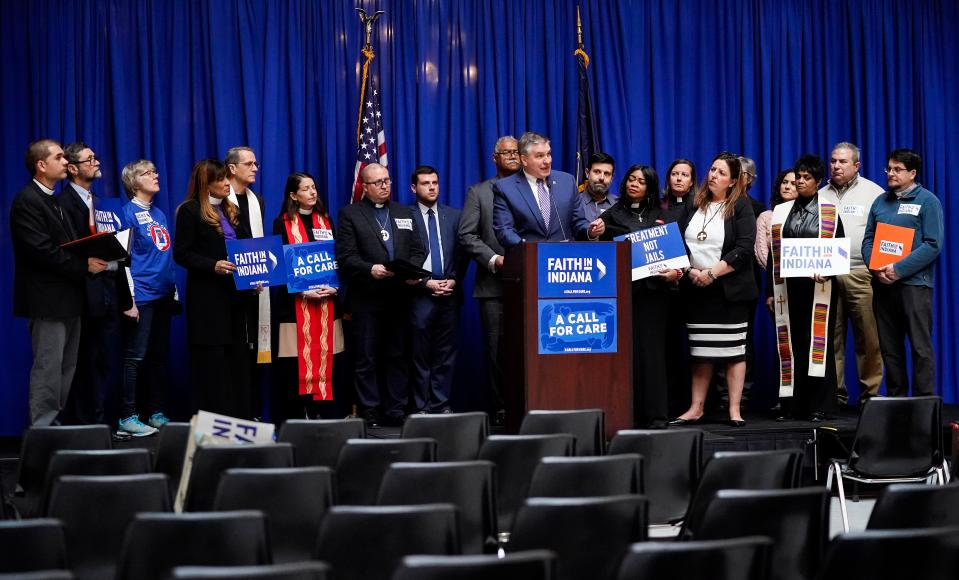Op/Ed: 'Be bold, think big,' act now to find solutions to Indiana's mental health crisis
Taking the time to understand complex issues and map out sustainable solutions is as critical as the boldness required to pursue them. In tackling our worsening mental health crisis, we have done the former. Now it is time to be bold, think big, and invest in solutions we can implement today. Two of the strategies laid out in Senate Bill 1 (SB 1) are a big step forward.
That planning-to-investment-to-execution process is very familiar to me. As a businessman, investor and philanthropist, I have observed and participated in the kinds of public-private partnerships necessary to address our most pressing challenges. I believe Hoosiers are ready to take this same approach to ensure each of us has access to the mental health services we all deserve.
The truth is the state of our mental health system is wholly unacceptable. It both threatens to undermine the incredible economic gains Indiana has made, and more importantly, is ravaging our children, families, friends and co-workers. The impacts are most severe, additionally, in our vulnerable communities.
More:Photos: Faith in Indiana kicks off monthly press conference at statehouse
From a macro perspective, effective mental health services are needed to strengthen our workforce, build our communities and keep Indiana a place worthy of job creation and business investment. Every day, our cities and state compete for talent and investment, both necessary for the continued growth, vitality and diversity of our businesses and industries. Not everyone will intuitively see the link, but structurally investing in and fixing our behavioral health system can ultimately make the difference between investment here or elsewhere. For perspective, according to a September 2022 report of the behavioral health commission, mental illness conservatively represents $4 billion a year in lost productivity and costs associated with premature mortality and chronic disease. Let that number sink in.

More importantly, perhaps, the mental health crisis is taking an almost unprecedented toll on Hoosier families, and short of bold solutions, the multi-generational impacts on our communities will be nothing short of disastrous. Here again, the data is clear. One in five Hoosiers suffers from mental illness and more than one third did not seek treatment last year because of costs. More than half of Hoosier children ages 12-17 who face depression did not receive care last year, and roughly 70% of young people in our juvenile justice system have mental health conditions. Sadly, it isn’t hard to see why, since 2016, more than 1,000 Hoosiers have been lost to suicide every single year.
More:Op/Ed: How are Indiana's children? State of the Child shows how we can help our youth
Personally, I have seen the impact of untreated mental health in my own journey, in my family, friends and business relationships. I have learned that mental health is a complex issue and meaningful change is challenging. It is crystal clear that we must change the paradigm, view mental health and substance use like any other chronic disease or condition and apply the same data-driven, innovative and compassionate care that we do to other aspects of health care.
SB 1 will do just that.
Now that we have understood the scope of the problem, we must supply the infrastructure needed to deliver quality behavioral health care. Further, identifying lasting and sustainable funding streams to support these efforts will ensure there is certainty for maintaining, growing and adapting this system to meet current and evolving mental health needs. In order to change their treatment practices and expand their reach to meet the surging demand for care, our providers need to know that there will be funding and structural support for these services in the years to come.
In SB 1, Sen. Mike Crider and the General Assembly have championed bold, forward-thinking legislation to create a sustainable funding mechanism through a $1 surcharge on phone bills. These resources will support the expansion of Indiana’s system of certified community behavioral health clinics (CCBHCs), a network equipped to deliver more equitable and statewide access to quality care. This bill represents an important two-pronged approach, one that solidifies a new structure needed to change the trajectory of mental health in our state and puts the funding behind it to make it possible.
I urge members of the General Assembly to support this vital legislation, and I encourage Hoosiers to weigh in with their elected officials on the importance of this issue.
Steve Simon is owner and alternate governor of Pacers Sports & Entertainment and a member of the Indiana Mental Health Roundtable.
This article originally appeared on Indianapolis Star: Indiana loses $4 billion in productivity yearly due to mental illness

